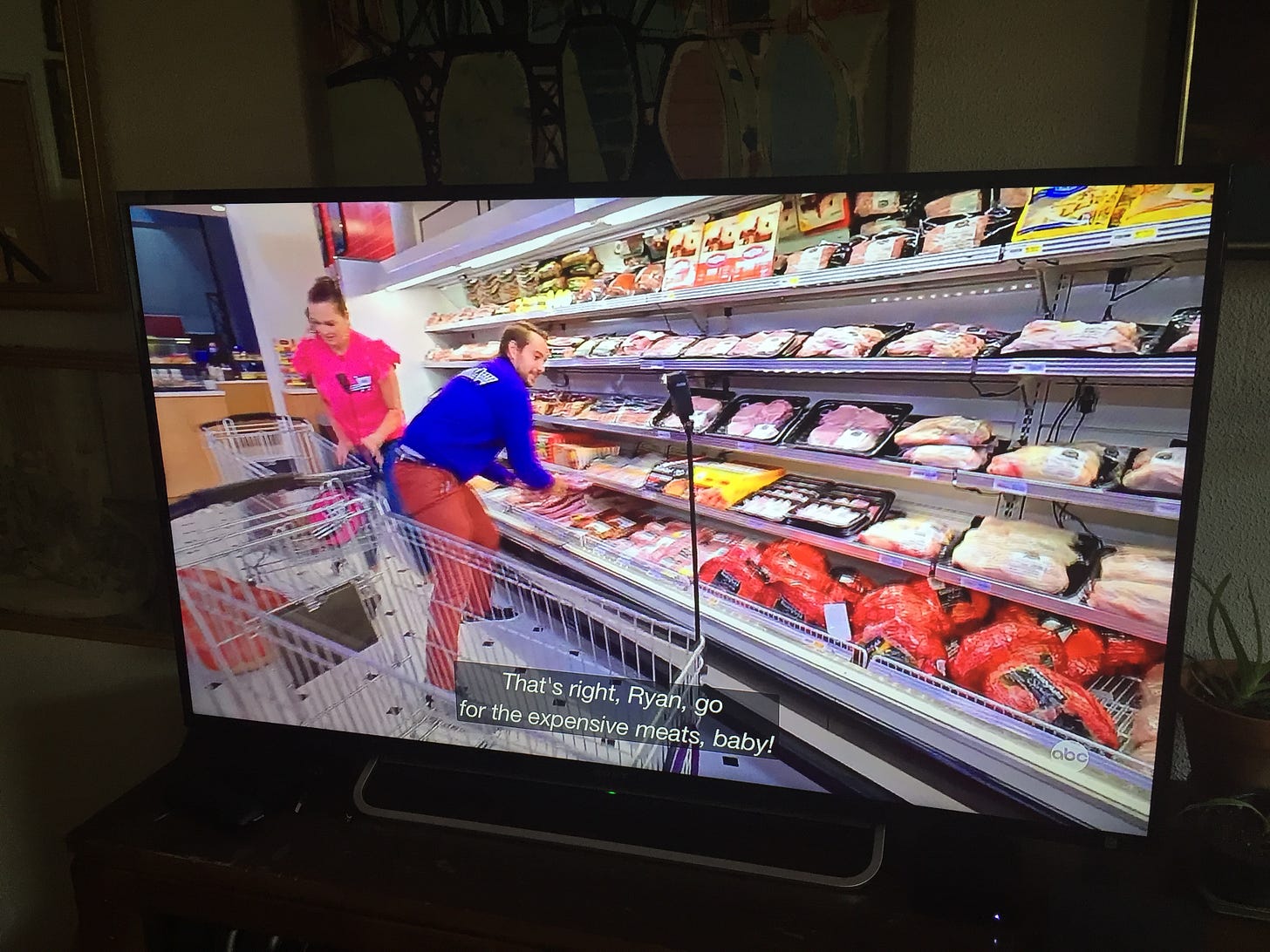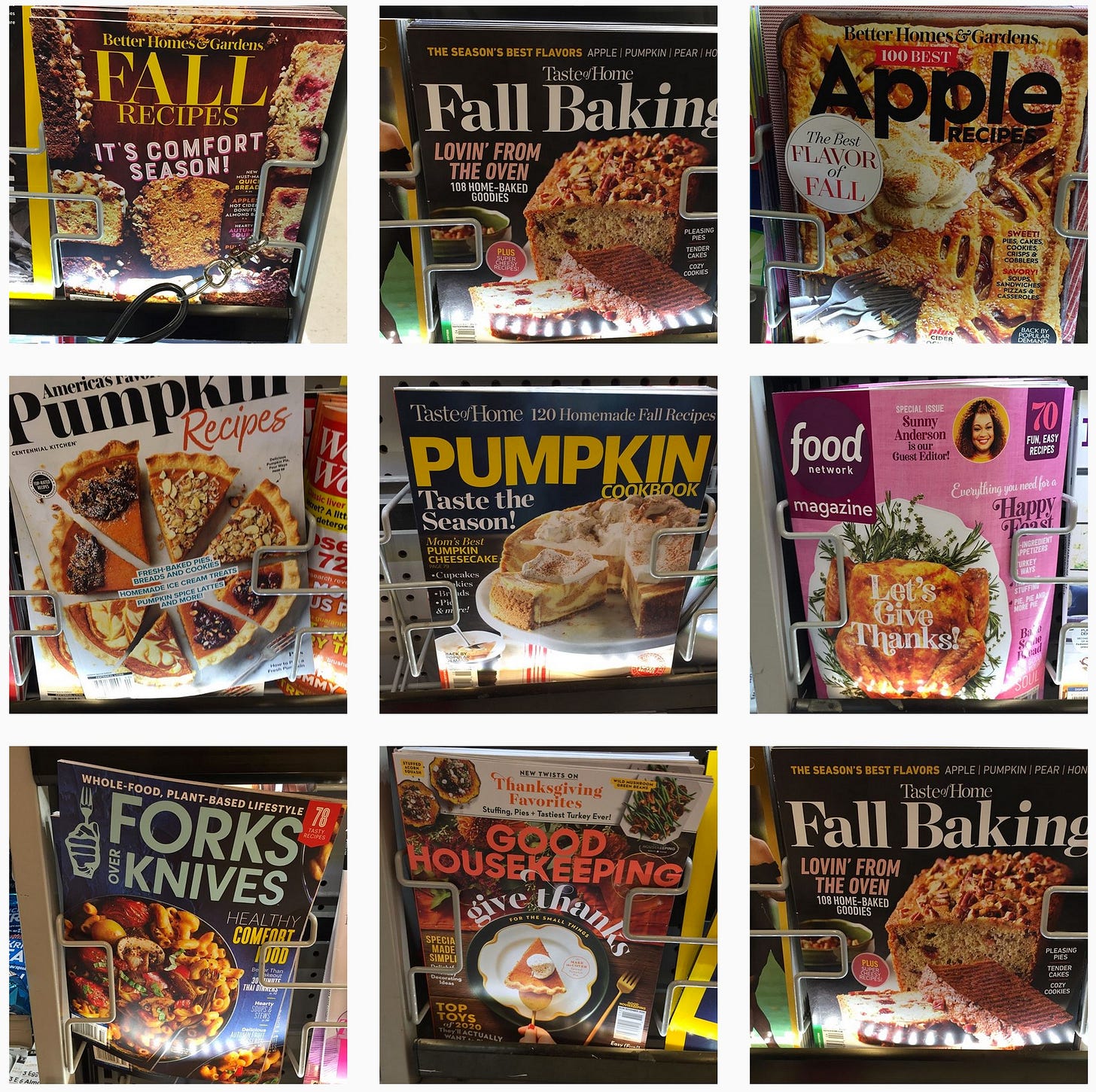TELEVISION DEP’T.
Attention, Shoppers

I WAS BORN a few years too late to have ever seen the original Supermarket Sweep, in the mid 1960s, but I always understood the spirit of it. On weekends, as part of the chores, our whole family would pile into the car and drive to the Acme Market in the shopping plaza by the I-95 exit, armed with a grocery list in my dad's crabbed printing, roughly sorted into categories. While our parents headed for the produce and meat departments to make value-and-quality judgments there, my brother and I would take torn-off strips of the list, pick up handheld shopping baskets, and scatter. Our goal was to get it all over with as fast as possible, loading our hand baskets to overflowing before circling back to dump them into the main family cart, then peeling away to grab more.
If you could drop me in that Acme Market today, I could fill a cart without hesitating—though you can't drop me there, because that Acme closed more than 25 years ago. I have no patience for the claims of the bogus academics in the so-called field of evolutionary psychology about how our modern behaviors are shaped by our distant past: that ancient adaptive needs explain why aging men leave their wives for their young research assistants, or why white reactionaries root for the cops to beat up protesters, or why Jeff Bezos avoids paying taxes. The truth is that our primate or pre-civilizational human forebears, whether monogamous or polyamorous, warlike or peaceable, lived in a world much too interesting for contemporary thought experiments to reach. One thing we can be sure our ancestors truly were focused on, however—a purpose that does feel wired into the essential human psyche—is knowing where to get the food.
Mostly I pass through life in a churn of forgetting, losing all memory of account logins or articles I've written or which old keys used to open what, yet a meaningful part of my brain or mind is dedicated to the layouts of supermarkets. Their patterns register on a pre-symbolic, pre-linguistic level, so that, as a mobile, bipedal omnivore, I learn them implicitly, deeply, and mostly uselessly. Beyond the old Acme, I still know how I would find my way to the live-fish department in the long-closed basement Kenzo market at the Dongzhimen exchange on Beijing's Second Ring Road; or the cold case of pig feet in the Johnnie's Foodmaster on Beacon Street in Somerville, before it became a Whole Foods; or the aisle with the haw flakes in the Oriental Market that used to be in the Wintergreen Plaza on Rockville Pike. In the non-defunct division, I could automatically navigate Korean Korner in Silver Spring (a half-dozen kinds of eggplant for all the eggplant-eating peoples of the world), the Hong Kong Supermarket in Flushing (duck legs to steam and roast as dinner for one), the Giant Food due west of Bethany Beach (charcoal, pork shoulder, sunscreen).
All this—along with a saturation promotional campaign, and constant asking from my younger son—led me to tune in to ABC's new Sunday primetime version of Supermarket Sweep, hosted by Leslie Jones. My children are sadly underexposed to family-style supermarket shopping; the aisles of our neighborhood Fairway are too narrow and crowded with angry old people to allow for team shopping missions, and we don't have a car, so we get most of our weight and volume of groceries from an online delivery company. But the younger boy sensed an opportunity to watch something loud and dumb, and there we were.

And Supermarket Sweep is unavoidably, unapologetically dumb. It's built around plain speed, not any real familiarity with or expertise in the art of foraging. The contestants are bombing their way through a soundstage supermarket, where they've had no prior chance to develop mastery, and they're not trying to feed themselves for the next week or make sure there's enough toilet paper. Aside from a few advanced game-show wrinkles—a handful of bonus-point shopping requests from the host, and a scattering of cumbersome or time-wasting special items—the job is what it was 50-plus years ago: to simply cram as many dollars' worth of groceries into the carts as you can before time runs out.
I wanted to try to figure out how to beat the supermarket, but the aisles all seemed interchangeable, glimpsed through the various moving camera views. It's always hard to look at groceries without being there: snapshots taken inside even a well-known supermarket (and who even stops to take any?) come out startlingly busy and cluttered; the photograph adds just enough alienating distance to make it possible to notice the sheer profusion of signs and colors and logos the eye has taught itself not to see.
Maybe the most absorbing part of the show was a subgame—during the preliminary quiz-show rounds, where the contestants compete to win extra shopping time in the main event—in which product logos were slowly built up, part by part, until someone recognized them. (The Tide logo took a surprisingly long time, and it was alarming how certainly a lone letter N in an arching green blob signified Nature Valley granola bars.) The sweeps themselves were frantic and impossible to keep track of, as people heaved frozen turkeys or boxed appliances or arm-sized plastic sleeves of meat into their carts.

There's no way to be a fully informed spectator, because—as in the original—the real drama of the scorekeeping, when the grocery loads get rung up, happens offscreen. The show is avoiding its fundamental dilemma: a good play in the game is a bad shopping decision in real life. Companies want their products to get exposure, but they don't want to call attention to how expensive they are. With present-day inventory-tagging technology, it should be possible to track the dollars in real time, to witness the cart value jump with each bale of diapers. It's just that it would be bad for the diaper business.
So the real gameplay—and with it the primal, thrift-be-dammed impulse to forage the most and best and ripest things—is hidden in a black box. To make up for the missing narrative and drama, the team with the highest dollar value in its carts advances to a jackpot round, racing the clock to complete a scavenger hunt worth up to $100,000. In the second session of the premiere episode, though, it was disappointing to realize that the sweep winners had failed in the jackpot round because they were a granddaughter-grandmother pair, and the elder teammate couldn't cover enough ground in the unfamiliar aisles to hunt down the right products. In her home supermarket, with Sunday dinner as the goal, I had no doubt she would have conquered the field.

Supermarket Sweep airs Sunday nights at 8 p.m. ET. on ABC television and streamings

Another Week, Another Hmm Weekly
GOOD MORNING! This is the latest HMM WEEKLY, successor publication to HMM DAILY, distributed via SUBSTACK, a newsletter delivery and reading platform.
We offer paid subscriptions for full access to HMM WEEKLY posts, with intermittent postings available free as we see fit.
We urge you to spread the word about HMM WEEKLY, and we encourage you to correspond with us! Email hmmweekly@substack.com. Thank you for reading.

THOUGHT DEP’T.

Do you have a thought? Send it to hmmweekly@hmmweekly.com.

VISUAL CONSCIOUSNESS DEP’T.
Autumnal Magazines

YOU CAN FOLLOW hmmweeklygram on Instagram.

BRAIN ITCH DEP’T.

SANDWICH RECIPES DEP’T.
YOU NEED TO have faith that this Dep’t. is about sandwiches. Meanwhile, before we get back to that, we continue our presentation of select recipes from the Brobdingnagian 1896 edition of The Boston Cooking-School Cook Book, by Fannie Merritt Farmer, Principal of the Boston Cooking-School, and a selection of items from
CHAPTER XXXVII.
RECIPES ESPECIALLY PREPARED FOR THE SICK.
Foods must be taken which are nutritious, easy of assimilation, and given frequently, in small quantities, and at regular intervals. The convalescent, if allowed to follow his own inclinations, often produces a relapse by improper diet.
Rye Meal Mush.
1/2 cup rye meal.
1/2 cup cold water.
1 1/4 cups boiling water.
1/2 teaspoon salt.
Mix meal, salt, and cold water. Add to boiling water, and boil five minutes. Cook one hour in double boiler. Serve with maple syrup.
Quaker Oats Mush.
2/3 cup Quaker Rolled Oats.
1 1/4 cups boiling water.
1/2 teaspoon salt.
Add salt to boiling water; then add oats, and cook one-half hour in double boiler. Serve with sugar and cream. Any preparation of steamed rolled oats may be used.
Hominy Mush.
1/2 cup fine hominy.
1 pint boiling water.
1/2 teaspoon salt.
Prepare as for Quaker Oats Mush, cooking one hour in double boiler.
We continue to maintain that we will get back to sandwiches soon, but in the meantime, if you decide to prepare and enjoy one of the above items, kindly send a picture to us at hmmweekly@substack.com.

HMM WEEKLY IS written by Tom Scocca, editor, and Joe MacSable, creative director.
If you enjoy Hmm Weekly, please let a friend know about it! If you're reading this because someone forwarded it to you, we invite you to sign up for a copy of your own right now.
Thanks for reading, and any time you want, email us at hmmweekly@substack.com.





